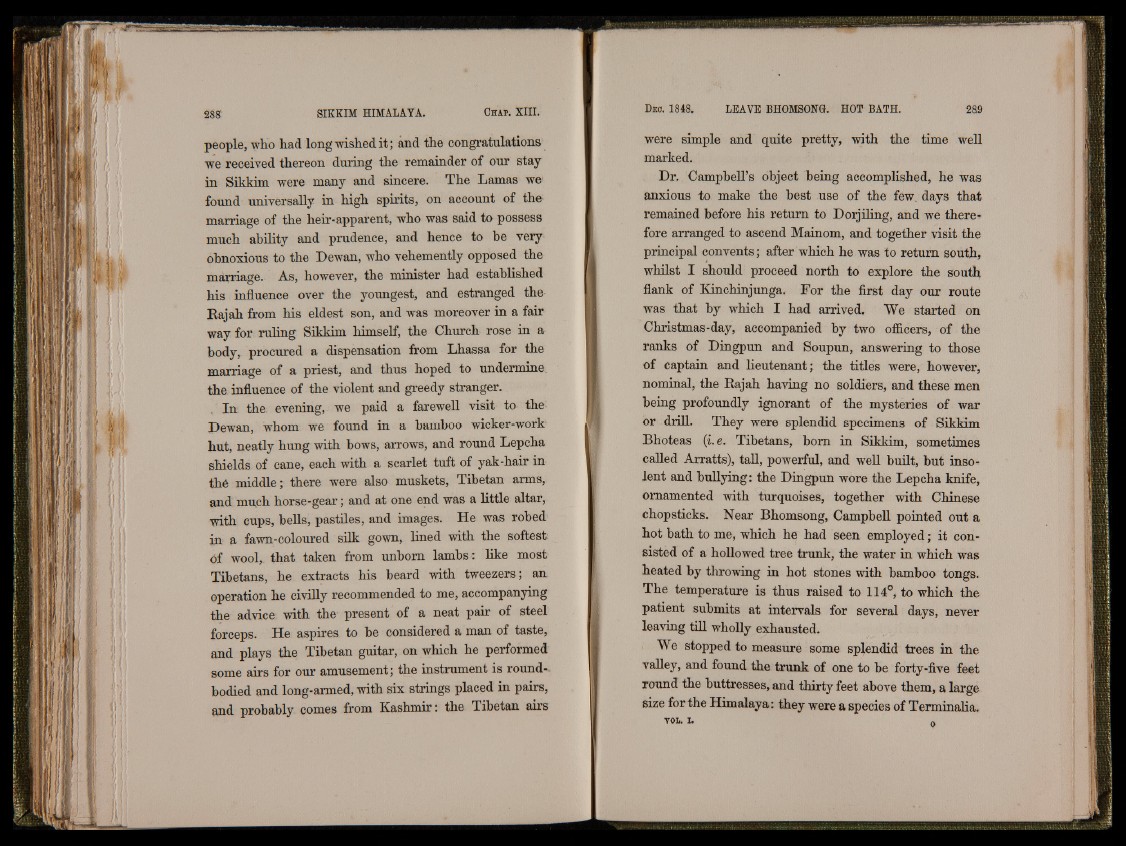
people, who had long wished it; and the congratulations
we received thereon during the remainder of our stay
in Sikkim were many and sincere. The Lamas we
found universally in high spirits, on account of the-
marriage of the heir-apparent, who was said to possess
much ability and prudence, and hence to he very
obnoxious to the Dewan, who vehemently opposed the
marriage. As, however, the minister had established
his influence over the youngest, and estranged the
Eajah from his eldest son, and was moreover in a fair
way for ruling Sikkim himself, the Church rose in a
body,, procured a dispensation from Lhassa for the
marriage of a priest, and thus hoped to undermine
the influence of the violent and greedy stranger.
In the evening, we paid a farewell visit to the
Dewan, whom we found in a bamboo wicker-work
hut, neatly hung with hows, arrows, and round Lepcha
shields of cane, each with a scarlet tuft of yak-hair in
thé middle ; there were also muskets, Tibetan arms,
and much horse-gear ; and at one end was a little altar,
with cups, bells, pastiles, and images. He was robed
in a fawn-coloured silk gown, lined with the softest
of wool, that taken from unborn lambs : like most
Tibetans, he extracts his beard with tweezers; an
operation he civilly recommended to me, accompanying
the advice with the present of a neat pair of steel
forceps. He aspires to be considered a man of taste,
and plays the Tibetan guitar, on which he performed
some airs for our amusement; the instrument is rounds
bodied and long-armed, with six strings placed in pairs,
and probably comes from Kashmir : the Tibetan airs
were simple and quite pretty, with the time well
marked.
Dr. Campbell’s object being accomplished, he was
anxious to make the best use of the few. days that
remained before his return to Doijiling, and we there-
fore arranged to ascend Mainom, and together visit the
principal convents; after which he was to return south,
whilst I should proceed north to explore the south
flank of Kinchinjunga. For the first day our route
was that by which I had arrived. We started on
Christmas-day, accompanied by two officers, of the
ranks of Dingpun and Soupun, answering to those
of captain and lieutenant; the titles were, however,
nominal, the Rajah having no soldiers, and these men
being profoundly ignorant of the mysteries of war
or drill. They were splendid specimens of Sikkim
Bhoteas (i. e. Tibetans, bom in Sikkim, sometimes
called Arratts), tall, powerful, and well built, but insolent
and bullying: the Dingpun wore the Lepcha knife,
ornamented with turquoises, together with Chinese
chopsticks. Near Bhomsong, Campbell pointed out a
hot bath to me, which he had seen employed; it consisted
of a hollowed tree trunk, the water in which was
heated by throwing in hot stones with bamboo tongs.
The temperature is thus raised to 114°, to which the
patient submits at intervals for several days, never
leaving till wholly exhausted.
We stopped to measure some splendid trees in the
valley, and found the trunk of one to be forty-five feet
round the buttresses, and thirty feet above them, a large
size for the Himalaya: they were a species of Terminalia.
VOL. i . 0